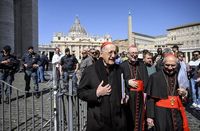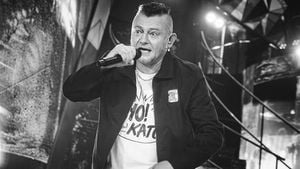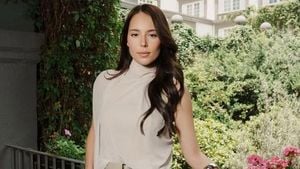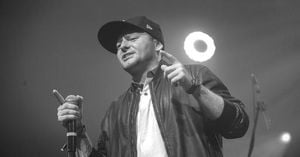In the wake of Pope Francis's passing, the College of Cardinals is now tasked with overseeing the Catholic Church until a new pope is elected. This conclave, where cardinals will convene in secrecy, has drawn attention to the few Canadian cardinals among the 252 members of the College. Of these, only four are eligible to vote in the upcoming election, as cardinals must be under 80 years old to participate.
The Canadian cardinals eligible to vote are Thomas Collins, Gerald Lacroix, Michael Czerny, and Francis Leo. Marc Ouellet, the fifth Canadian cardinal, has surpassed the age limit and cannot cast a ballot. According to the Vatican's official website, the presence of only five Canadian cardinals highlights the limited representation from the country in this significant ecclesiastical event.
Emma Anderson, a professor of religious studies at the University of Ottawa, has weighed in on the prospects of a Canadian pope. "The chance of a Canadian pope being elected is very small," she stated, pointing out that while Lacroix is viewed as a favorite, past allegations of sexual misconduct have marred his reputation. Lacroix, who has denied these allegations, was accused of molesting a 17-year-old girl, but a Vatican investigation found no evidence of wrongdoing.
Despite these challenges, Lacroix is not the only Canadian contender. Thomas Collins, the retired archbishop of Toronto, is 78 years old and was elevated to the College of Cardinals by Pope Benedict XVI in 2012. Born on January 16, 1947, in Guelph, Ontario, Collins has held various leadership roles within the Church, including bishop coadjutor and archbishop of Edmonton before his appointment in Toronto.
Michael Czerny, another Canadian cardinal, was born on July 18, 1946, in Brno, Czechoslovakia, and emigrated to Montreal at the age of two. Appointed a cardinal by Pope Francis in 2019, Czerny has been actively involved in migration issues and has spoken about the need for the Church to address the plight of refugees. At 78, he shares the same age as Collins, yet both are seen as less likely candidates due to their age and the current dynamics within the College.
Youngest among the Canadian cardinals is Francis Leo, born on June 30, 1971, in Montreal. At 53, Leo is the 18th cardinal in the history of the Catholic Church in Canada and has garnered attention for his extensive leadership experience, which includes serving in various papal missions. He was appointed auxiliary bishop of Montreal in 2022 and became the archbishop of Toronto in 2023. However, some analysts believe that his relatively young age may work against him in the conclave.
Marc Ouellet, the fifth Canadian cardinal, is ineligible to vote due to his age of 80, having been born on June 8, 1944. He was appointed a cardinal by Pope John Paul II in 2003. Ouellet has faced allegations of sexual misconduct in recent years, which he has denied, and the complaints were ultimately dismissed. His previous standing as a strong candidate for the papacy has been complicated by these accusations.
As the conclave approaches, Vatican experts are also identifying potential successors, known as "papabili." Prominent names include Cardinals Pietro Parolin and Matteo Zuppi from Italy, Luis Tagle from the Philippines, and Michael Czerny from Canada. Parolin, the current Secretary of State, is viewed as a continuation of Pope Francis's vision for the Church, while Zuppi is recognized for his commitment to helping the poor and migrants.
Internationally, the list of candidates reflects the global nature of the Catholic Church. Tagle has been a close collaborator of Pope Francis and is often seen as a representative of the new direction the Church is taking. Czerny’s focus on migration issues resonates with many who see the Church's role in advocating for refugees.
Among other notable candidates are Cardinal Claudio Gugerotti, the prefect of the Dicastery for the Eastern Churches, and Pierbattista Pizzaballa, the Latin Patriarch of Jerusalem. The latter's potential election could signal the Vatican's concern for the situation in the Holy Land, given the ongoing challenges faced by Christians in the region.
Cardinal Jean-Marc Aveline from Marseille and Anders Arborelius from Sweden have also been mentioned as possible contenders. Meanwhile, Cardinal Robert Francis Prevost from the United States is among the candidates from North America, adding to the diverse pool of potential leaders.
The significance of this conclave cannot be overstated, especially considering that 107 of the 135 cardinal electors were appointed by Pope Francis himself. This composition may heavily influence the election of his successor and the direction the Church will take in the coming years. As the world watches, the cardinals will gather in the Sistine Chapel, taking an oath of secrecy as they embark on this critical decision-making process.
As the Catholic Church stands at a crossroads, the election of a new pope will not only determine the future leadership of the Church but also reflect the evolving priorities and challenges facing its global congregation. The presence of Canadian cardinals, despite their limited numbers, underscores the diverse voices that will be part of this historic moment.





